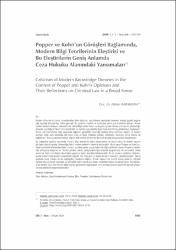Popper ve Kuhn’un görüşleri bağlamında, modern bilgi teorilerinin eleştirisi ve bu eleştirilerin geniş anlamda ceza hukuku alanındaki yansımaları

Göster/
Erişim
info:eu-repo/semantics/openAccessTarih
2020Yazar
Anadolu Üniversitesi, Hukuk Fakültesi, Ceza ve Ceza Muhakemesi Hukuku Anabilim Dalı
0000-0001-5028-1216
Karakehya, Hakan
Üst veri
Tüm öğe kaydını gösterKünye
Karakehya H. (2020). Popper ve Kuhn’un Görüşleri Bağlamında,Modern Bilgi Teorilerinin Eleştirisi ve Bu Eleştirilerin Geniş Anlamda Ceza Hukuku Alanındaki Yansımaları. Çankaya Üniversitesi Hukuk Fakültesi Dergisi, 5(1), 1921 - 1939.Özet
Modern dönemin en temel unsurlarından birini oluşturan aydınlanma sayesinde, kamusal alanda geçerli yegane bilgi kaynağı bilimsel bilgi haline gelmiştir. Bu gelişme insanlık ve medeniyet adına çok önemli bir adımdır. Ancak modern sürecin ilerleyen zamanlarında bilimselliğe verilen önem ve duyulan güven o kadar artmıştır ki, bilimselliğin dayanak yapıldığı bir takım anti demokratik ve ayrımcı uygulamalar toplumsal alanda baş göstermeye başlamıştır. Bunun yanında bilimsel bilgi sayesinde sağlanan gelişmeler insanlığa sadece kolay üretmeyi, ulaşımı ve iletişim kurmayı değil, aynı zamanda çok daha kolay ve fazla miktarda çalmayı, öldürmeyi, bozmayı, tahrip etmeyi de sağlamıştır. Bunun yanında bilimsel bilginin elde edilme yöntemleri de ciddi şekilde sorgulanmaya başlanmıştır. Bu bağlamda çalışma içerisinde modern bilgi teorilerine ilişkin eleştirileriyle ön plana çıkan iki önemli yazarın görüşleri doğrultusunda, bilimselliğe ilişkin modern teorilerin eleştirisi yapılacaktır. Bu iki yazar Popper ve Kuhn’dur. Metin içerisinde bilimselliğe ilişkin modern teorilerin genel yapısı hakkında bilgi verildikten sonra, Popper’ın tarihsicilik anlayışına eleştirisi ve bilimsel yöntem olarak yanlışlanabilirliğin önemini vurgulaması ele alınacaktır. Daha sonra ise Kuhn’un bilimsel devrimlerin yapısına ilişkin tespitleri irdelenecektir. Bu iki yazarın eleştirileri doğrultusunda modern bilgi teorileri değerlendirildiğinde, her bilim alanına ilişkin bir takım sonuçlar çıkartılabilecektir. Geniş anlamda ceza hukuku da bu alanlardan müstesna değildir. Ancak ulaşılan en önemli sonuç şudur ki; bilimsel verilere hep şüpheyle bakılmalı ve bilimsellik hiçbir zaman için insani değerlerin önüne koyulmamalıdır. Bu şekildeki bir hareket tarzı hem bilimin daha sağlıklı gelişmesini sağlayacak hem de insanlığımızı saçma bir gelişim amacına feda etmemizi engelleyebilecektir. Thanks to the enlightenment, which constitutes one of the most fundamental elements of the modern era, the only valid information source in the public sphere has become scientific knowledge. This development is a very important step in the name of humanity and civilization. However, the importance given to science and the confidence felt in the later stages of the modern process reached extreme dimensions. For this reason, a number of anti-democratic and discriminatory practices in which scientificity is based has begun to emerge in the social field. In addition, advances provided by scientific knowledge have enabled mankind not only to produce, transport and communicate easily, but also to steal, kill, disrupt and destroy much more easily. At the same time, the methods of obtaining scientific knowledge have been seriously questioned. In this context, in line with the views of two important writers who come to the fore with their criticisms about modern information theories, modern theories of information will be criticized. These two authors are Popper and Kuhn. In the text, firstly, the general structure of modern theories related to science will be given. Popper's critique of historicism and his emphasis on the importance of falsification as a scientific method will be discussed. Then, Kuhn's determinations about the structure of scientific revolutions will be examined. When the theories of modern knowledge are evaluated in line with the criticism of these two authors, a number of conclusions can be drawn about each field of science. In a broad sense, criminal law is also not exceptional. The most important result of these criticisms in the field of criminal law is as follows; scientific data should always be looked at with suspicion and scientificity should never be put before human values. Such a way of action will both ensure a healthier development of science and prevent us from sacrificing our humanity for a ridiculous development goal.

















